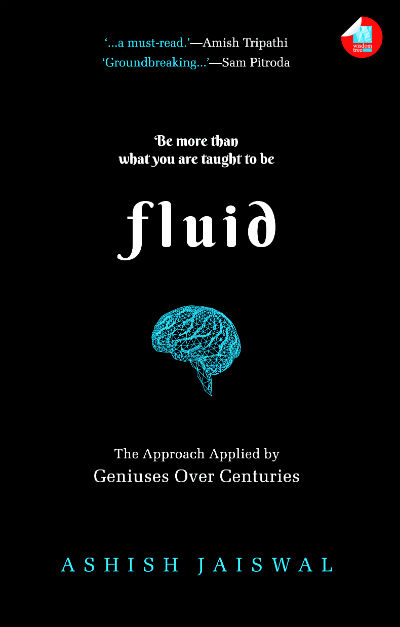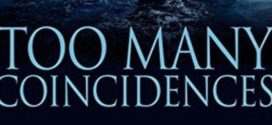Recently we came across a book named Fluid: The Approach Applied by Geniuses Over Centuries by Ashish Jaiswal. Our pre-ordered copy has arrived before a few days. While the book is available on Amazon and other online stores, its formal launching is scheduled on 2nd November, 2018.
| Book Title | : | Fluid: The Approach Applied by Geniuses Over Centuries |
| Author | : | Ashish Jaiswal |
| Publisher | : | Wisdom Tree; (15 October 2018) |
| # of Pages | : | 256 (Paperback) |
| # of Chapters | : | – |
| Purchase Link(s) | : |
As I’ve not finished reading the book yet, it will be early to share my reviews for the same. But, let me share some interesting information I’ve come across, about the book and the author.
Here is the cover of the book.

Fluid: The Approach Applied by Geniuses Over Centuries by Ashish Jaiswal | Book Cover
I like the finishing of the cover page, the use of basic black of basic black and white color in the glossy finish gives a rich look to the book. We shall talk more about it in our book reviews.
The concept of the book is really good. And if it lives up to the expectations, it surely will be part of “must read” books for many.
As the world evolves we also need to, but at the same time, we must not forget the good things we possess. Be it a material resource, a thought or moral, a system, a tradition or anything. If we start thinking without prejudices and always trying to look somewhere else for the solutions to our problems, probably, we will never get 100% accurate answers. And yes, everything must be checked logically. Something couldn’t be good just because it belongs to so and so place or done by someone. So, whenever you have a doubt, you should be free to ask and get the most logical and satisfying answer for the same.
It always comes to me as an exclamatory question that why India is known for the fantastic past only? And why modern India is not? Why people still place it into “developing countries”? Of course, I am not trying to say that the others are wrong. It is the citizens of the country who probably are not much aware of the fantastic attributes from the past of the country and thus are not trying to preserve and utilized it.
In addition to the invention of ZERO, India (that is Bharat) had and has the richest number system. Some of the important calculation marks are mentioned in the below mentioned WikiPedia article:
Takshashila (aka Taxila) and Nalanda were the world famous universities where students from around the globe came to seek the knowledge. Probably India is the only country which has epics and ancient Literature (including but not limited to Ramayana, Mahabharata, Upanishads) where the importance of education is mentioned. In fact, the main characters studying in a Gurukul is an important part in both Ramayana and Mahabharata. You can go through Vedic scriptures and stories from Upanishad to see many education-oriented stories unfolding.
Why I am talking about the glorious past of India, especially in terms of education, now? Well, this book claims to have the thoughts about “rethinking education” and the author tried to seek answers from the education system from those old days of India.
So, if a book is talking about (and not just talking about, but rather present the options) rethinking the education system and make it better, it is definitely worth going for.
In addition, the book has received advanced praise from many noteworthy people. Here are some of those.
I think one of the misfortunes of Indian education is that it is not rooted in our own traditions. There are many scientific texts from ancient India, which have not been studied by us. Even the arts were studied by our ancestors through a mathematical and scientific perspective. An example of a perfect partnership of the arts and sciences. Ashish has taken an important step in addressing the problem of the lack of knowledge of our ancient texts through his book Fluid, based on knowledge gleaned from Vishnudharmottaram Puranam. His book is a must-read.
—Amish Tripathi
Celebrated Indian author
Groundbreaking book in many sense. You will not look at education the same way again. Very interesting for every learner. Equally interesting for teachers and parents.
—Sam Pitroda
Holds 100 worldwide patents and is credited with laying the foundation of telecommunication and technology revolution in India
As a scientist in pursuit of solutions for sustainability and well-being of people and our planet, I recognise the immense need to work fluidly across disciplines by breaching traditional disciplinary boundaries. A powerful book and must-read for both specialists and specialists-in-making.
—Alark Saxena
Director, Yale Himalaya Initiative and Research Scientist, Yale University
The advance praise is really intriguing and it makes me curious to complete it at the earliest.
Recently I came across an interesting Tweet by the author, Ashish Jaiswal.
Presenting to the world groundbreaking re-discovery of Hans Purush from long lost Vishnudharmottarm Puran. Grand Indian scientific heritage https://t.co/ciAVHjYgWv @authoramish @wisdomtree @ShobitArya @vinay1011 @timesofindia #hanspurushvsvitruvianman #fluid #vishnudharmottaram
— Ashish Jaiswal (@ashishjaiswaled) October 25, 2018
It is an interesting “re-discovery” (as the author says) for sure then. Actually, as Dan Brown takes help of his friend John Langdon for symbols and other stuff; probably some authors and/or research analysts can dive deep into various symbols mentioned in various ancient Indian scripturs. Of course, authors like Amish Tripathi, Devdutt Pattanaik and others already does it to an extent.
By the way, the talks we have done till now may give you an impression that the book when trying to discover best of the education elements from the glorious past of India, possibly disapproves the similar stuff from the foreign countries. That is not true. The book has a dedicated chapter to Leonardo-Da-Vinci. And, it talks about some of lesser-known talents of this famous artist. So, there are no prejudices. There is a very important philosophy India has followed since ancient times, that is “वसुधैव कुटुम्बकम”. It means, “the entire world is a family”, and when you consider everyone as a family member, you will find and accept good things, attributes and lessons from him/her without any prejudice.
Are you curious to read this book? What do you think about this article? Should we publish more such articles to share our thoughts about the books we are reading and planning to publish book reviews for the same?
 ThinkerViews – Views And Reviews Personal views and reviews for books, magazines, tv serials, movies, websites, technical stuff and more.
ThinkerViews – Views And Reviews Personal views and reviews for books, magazines, tv serials, movies, websites, technical stuff and more.



